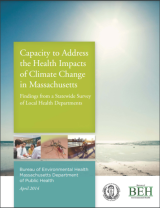Massachusetts Surveys Readiness and Resilience of Public Health Departments

Changes in environmental conditions can threaten human health through a variety of pathways. Some examples include:
- More frequent and intense natural disasters.
- More days of higher average temperatures.
- Decreased air quality.
- Increased spread of vector-borne diseases.
Massachusetts — recognizing this risk — surveyed its local boards of public health to gauge the state’s level of public health preparedness for these hazards and impacts.
The Massachusetts Department of Health was interested in the local boards’ current understanding, level of preparedness, and response capabilities. The survey covered surveillance, planning, and intervention activities associated with:
- Heat stress.
- Hazardous weather events.
- Indoor air quality.
- Food supply/agricultural issues.
- Vector-borne diseases.
- Water quality issues.
The survey helped identify communities that may be more vulnerable to hazards and impacts. State and local communities can use this knowledge to increase resiliency and adaptive capacity by more effectively guiding and targeting resources and actions to vulnerable health departments.
| How Did They Do It? | Applicable EPA Tools |
|---|---|
Assessed the state public health system’s current perceived capacity to deal with projected risks.
| CDC's Health Vulnerability: Climate Change Guide for Health Departments helps communities assess capacity and vulnerability to climate risks. Health Vulnerability: Climate Change Guide for Health Departments * (This is a non-EPA resource from the Centers for Disease Control and Prevention.) |
Prepared a final report with recommended steps to increase public health system’s adaptive capacity.
| EPA's Climate Change Indicators website provides information to better increase knowledge of the expected human health risks from changing conditions. Understanding the Connections Between Climate Change and Human Health |
Similar Cases and More Information
Massachusetts acknowledged that while the survey has helped identify prospective vulnerabilities, they are unable to tie this data to projected vulnerabilities without further research. To see an example of how a community has identified projected public health vulnerabilities, see the Minnesota Climate Health case study.
To see an example of specific steps to reduce vulnerabilities and adapt to changing conditions, view Chicago, IL Uses Green Infrastructure to Reduce Heat Event Impacts, or for how to increase adaptive capacity of vulnerable populations, view Chicago, IL Improves Heat Event Preparedness.
- Minnesota Climate Health Case Study
- Chicago, IL Uses Green Infrastructure to Reduce Heat Event Impacts
- Chicago, IL Improves Heat Event Preparedness

